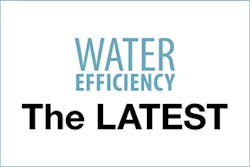Water Environment Research Open Access Article Assesses Performance of Gravity Flow Membrane Reactor in Municipal Wastewater
The open access article in the February 2018 issue of Water Environment Research (WER) evaluates the efficiency of a gravity flow membrane reactor to treat a municipal wastewater stream.
“Using a gravity flow membrane bioreactor called the biomass concentrator reactor, Platten et al. achieved 93 percent COD and 99 percent ammonia removal,” WER Editor-in-Chief Tim Ellis said. “Total nitrogen removal (46 percent) was hindered by limited COD to drive denitrification. Membrane fouling occurred on two occasions (after approximately 100 and 200 days of continuous operation, respectively), and the membrane was easily cleaned with a combination of bleach and acid. As a gravity flow system, only 2.5 cm of pressure head was required to operate the membrane bioreactor.”
Selected WER articles such as this one are available free to the public on a monthly basis through an open access program. In addition, authors can pay a fee to make their accepted articles open access. Click here to download “Evaluation of a Gravity Flow Membrane Bioreactor for Treating Municipal Wastewater” by William E. Platten, Pablo Campo; Makram T. Suidan; and Albert D. Venosa.
Published by the Water Environment Federation since 1928, WER is a popular professional journal that features peer-reviewed research papers and research notes, as well as state-of-the-art and critical reviews on original, fundamental, and applied research in all scientific and technical areas related to water quality, pollution control, and management. WER is available in both print and online formats and receives approximately 400 new research submissions each year.
About WEF The Water Environment Federation (WEF) is a not-for-profit technical and educational organization of 34,000 individual members and 75 affiliated Member Associations representing water quality professionals around the world. Since 1928, WEF and its members have protected public health and the environment. As a global water sector leader, our mission is to connect water professionals; enrich the expertise of water professionals; increase the awareness of the impact and value of water; and provide a platform for water sector innovation. To learn more, visit www.wef.org.
